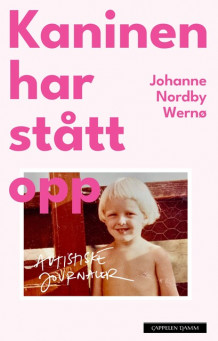Autistic Diaries is a contribution to our understanding of autism’s many facets, and an appeal for new attitudes towards neurodiversity. Perhaps new stories about autism can serve an even broader purpose: allowing us all to be both strong and vulnerable – and, above all, different.
One July morning, the summer I turned 42, I woke up with a brand new thought.
Author Johanne Nordby Wernø discovered at the age of 42 that she is autistic – after living half her life, having children, and holding leadership positions. Autistic Diaries recounts the months that followed this realisation. With energetic and emotionally perceptive prose, the author tells the story of her late diagnosis.
What connects Agatha Christie's famous disappearance in 1926 with the impact of the coronavirus pandemic in a particular neighbourhood in Oslo? What unites the philosophical insights of Emmanuel Levinas with Julian Assange's sense of justice and Lisa Simpson's lonely intellect? Why has there long been an interest group in Scotland for women diagnosed with autism later in life, while in Norway doctors still send people home without a referral to a specialist if they can make eye contact and hold a job? And is it a coincidence that the Scottish organisation has the same name as the hotel where Agatha Christie was found after her disappearance?
After four decades of feeling different, Wernø finally had an explanation. She soon realised that the stories of late-diagnosed autistics – especially women – were shockingly absent from public discourse.
NOMINATED FOR THE BRAGE PRIZE FOR BEST WORK OF NON-FICTION 2025
«What does it actually mean to write good nonfiction with verve and creative surplus As a critic, it can sometimes be difficult to define, until suddenly one day you're sitting there with a prime example in your hands. When you know you know. And with art critic and curator Johanne Nordby Wernø's debut book, Autistic Diaries, you just know. That here, you've gained access to a completely unique, autobiographical voice. And that this will most likely stand as one of the best non-fiction releases of the year. […] Here, every sentence has been measured and weighed, not a single word feels overused or chosen at random; in fact, I simply don't think there's a single lacklustre formulation across nearly 250 pages.»
MORGENBLADET
To the top
